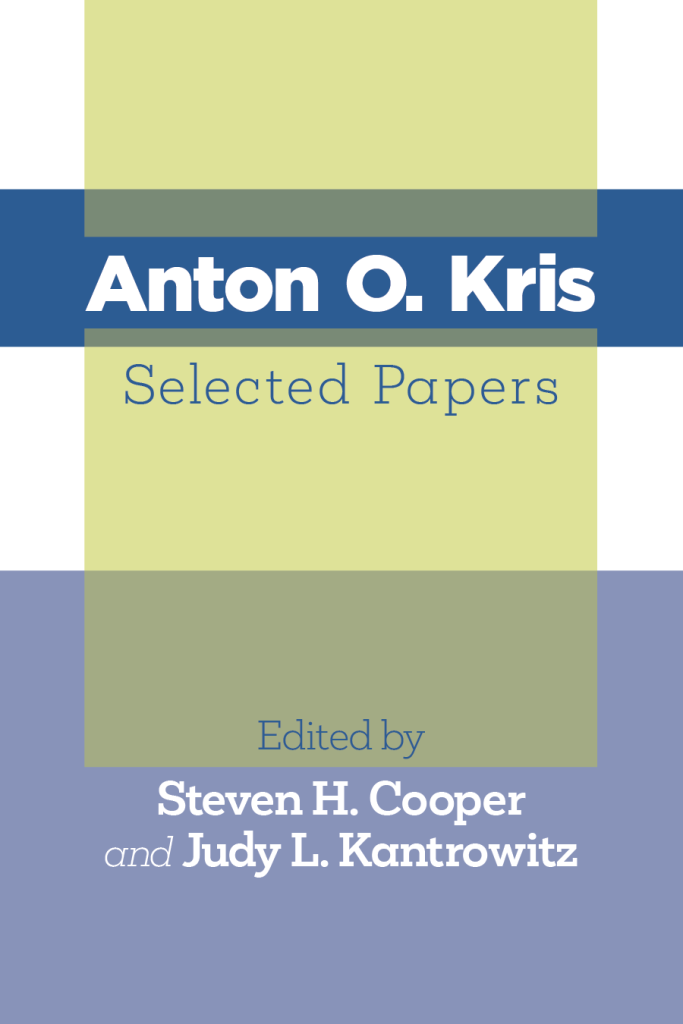Book purchases can be made here.

About the Book
The work of Tony Kris is a rare treasure for practicing psychoanalysts: He was famous for making grand technical terms work for practicing analysts in their office. What is the actual experience of a patient who is wrestling with a “conflict?” Kris reaches into that most basic term and finds that it may refer to two quite different kinds of quandary, each with its own set of choices. He describes the particular kind of pain that patients fear. (Think how overlooking what’s at stake in one of those possibilities might distort an analyst’s sense of a patient’s struggle!) Likewise, Kris looks sharply at “free association” and discovers the much larger world “free association” discloses if we allow a glaringly obvious resistance its rightful role in “resistance.” —LAWRENCE FRIEDMAN, MD
This remarkably enlightening and engaging selection of papers are ones only Tony Kris could have written, bringing to his roots in the richness of classical psychoanalysis the vigor of fully openminded incisive curiosity and disciplined thinking. The gems within this volume are thus the product of ever fresh serious thinking about clinical experience, like classical music in fully sophisticated modernity, free from the static of both orthodoxy and parochial polemics. Reading this work, one finds fresh ways of understanding clinical analysis, both new answers and new questions. —WARREN S. POLAND, MD
A compilation of classic papers, written over a period of forty years by a master clinician, and theoretician, Anton Kris’s Selected Papers continue to be relevant to contemporary psychoanalysts. This book is a pleasure to read. Kris’s work speaks directly to the reader. His ideas are clearly stated, without pretense or the wish to impress. We find here concepts that have become mainstays of analytic thinking: “convergent and divergent conflict”; free association and “resistance” and “reluctance”, the forces that impede it; “functional neutrality” and its importance in countering patients’ self-criticism. We are left with a renewed appreciation for a leader of our field. —LUCY LAFARGE, MD
Anton O. Kris, MD (2021–1934) grew up in New York City and graduated from Yale University and Harvard Medical School, and he completed his psychiatric training at Massachusetts Mental Health Center, and his analytic training at Boston Psychoanalytic Society and Institute (BPSI). A worldrenowned psychoanalyst, Dr. Kris served as a Clinical Professor of Psychiatry at Harvard Medical School, and as Training and Supervising Analyst at the BPSI. For over 50 years, he taught hundreds of psychiatrists and psychoanalysts while maintaining a thriving clinical practice. The author of Free Association: Method and Process, he served on the editorial boards of several psychoanalytic journals, on the Board of Trustees of The Anna Freud Foundation, and as Executive Director of The Sigmund Freud Archives. Among his many awards, he received the Lifetime Achievement Award from the Massachusetts Psychiatric Society (2015) and the Sigourney Award (2020). As the Sigourney awards committee wrote, “Dr. Kris’ work helped provide unprecedented visibility of Freud and psychoanalysis, the value of which will be apparent to future generations of analysts, scholars, historians and the lay public all around the world.”
About the Book
Judy Kantrowitz, PhD, is a training and supervising analyst at the Boston Psychoanalytic Institute and a corresponding member (formerly known as Associate Professor) at Harvard Medical School. She is the author of 4 books: The Impact of the Patient on the Analyst (1996); Writing about Patients: Responsibilities, Risks and Ramifications (2008); Myths of Termination: What Patients Can Teach Analysts About Endings (2015); and The Role of the Patient: Analyst Match in the Process and Outcome of Psychoanalysis (2020). She has served on the editorial boards of The Journal of American Psychoanalysis and The Psychoanalytic Quarterly for 3 and 4 decades, respectively, publishing papers in each as well as The International Journal of Psychoanalysis. She is in private practice in Brookline, MA.
Steven Cooper, PhD, is a Training and Supervising Analyst at the Boston Psychoanalytic Society and Institute and the Columbia Center for Psychoanalysis. He is a Clinical Professor of Psychiatry at Columbia University and Adjunct Clinical Professor at New York University Postdoctoral Program in Psychoanalysis. He currently maintains a full-time practice in New York. He served as Joint Editor-in-Chief of Psychoanalytic Dialogues from 2007-2012 and is now Chief Editor Emeritus. He has also served multiple terms on the editorial boards of The International Journal of Psychoanalysis and The Journal of the American Psychoanalytic Association and is a Consulting Editor for Contemporary Psychoanalysis.
Dr Cooper is the author of four books in psychoanalysis and a fifth to be published in 2025: Objects of Hope: Exploring Possibility and Limit in Psychoanalysis, published by The Analytic Press in 2000; A Disturbance in the Field: Essays in Transference-Countertransference published by Routledge Press in 2010; The Analyst’s Experience of the Depressive Position: The Melancholic Errand of Psychoanalysis published in 2016 by Routledge Press and is now translated into Italian by Routledge; and his most recent book, Playing and Becoming in Psychoanalysis was published by Routledge in October, 2023 and is being translated into Russian. In 2025, his book co-edited with Christopher Lovett titled Beyond Playing and Dreaming: Reflections on Winnicott’s Letters to Bion, will be published by Routledge.

